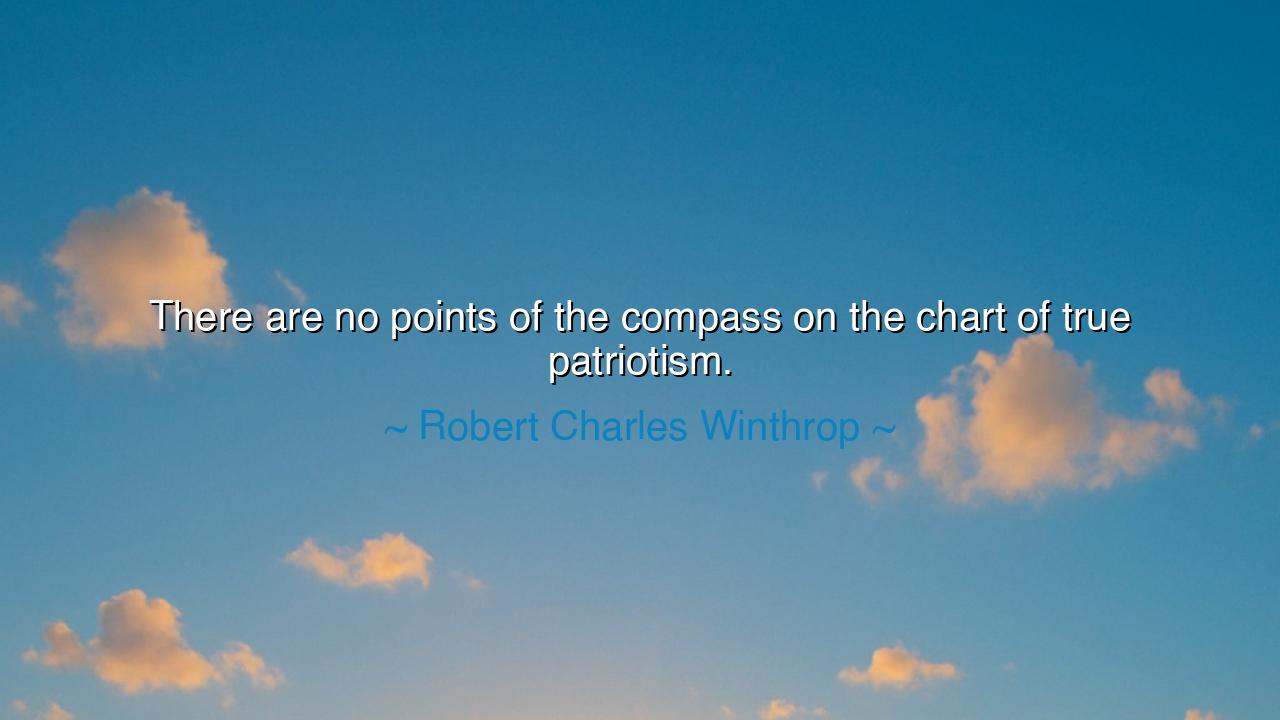
There are no points of the compass on the chart of true






The orator and statesman Robert Charles Winthrop once proclaimed: “There are no points of the compass on the chart of true patriotism.” In this brief yet profound declaration, he invites us to consider that patriotism is not confined to direction, ideology, or rigid prescription. It is not measured by political alignment, geographic allegiance, or blind obedience to a faction. Rather, it is a moral compass of the heart, guided by virtue, duty, and love of the common good. True patriotism transcends partisanship, sweeping beyond the limitations of temporary winds or local maps.
In the eyes of the ancients, the virtue of loyalty was not a fixed coordinate but a living principle. The philosopher-citizen was expected to navigate the complexities of governance, justice, and morality by the light of conscience rather than the markers of convention. Winthrop’s metaphor of a chart without compass points reminds us that love of country cannot be reduced to a simple direction or a set of instructions. It requires judgment, courage, and discernment to act rightly in times of peace as well as crisis.
History is filled with examples of this principle in action. Consider George Washington, who led a fledgling nation through its infancy. He could not rely on precedent, for none existed; he had no fixed compass points to guide his decisions. Yet, guided by the ideals of liberty, justice, and unity, he charted a course that safeguarded the fledgling republic. His patriotism was not defined by faction or fleeting popularity, but by the moral and practical judgment of what would best serve his country. Winthrop’s words echo Washington’s example: patriotism is navigated by principle, not prescription.
The meaning of this quote extends beyond politics. True patriotism requires individuals to rise above convenience, passion, or partiality. It calls for attention to what is right rather than what is expedient. When citizens measure loyalty solely by ideology, they risk distorting the very values that patriotism seeks to uphold. Winthrop warns that there are no fixed compass points—no simple north, south, east, or west—on the journey of moral and civic duty. Every generation must discover its own course, guided by conscience, reflection, and a commitment to the public good.
Consider the courage of the abolitionists in the 19th century, who challenged their fellow citizens to confront the moral stain of slavery. Many of their neighbors claimed loyalty to the nation, yet failed to recognize the injustice within it. These reformers navigated the uncertain waters of public opinion and law without the certainty of a fixed compass. Their patriotism was true, because it sought the nation’s highest ideals—liberty, equality, and justice—rather than mere obedience to current customs or policies.
Winthrop’s metaphor also teaches that patriotism is active, not passive. It requires engagement, judgment, and at times, dissent. One cannot follow a map blindly or defer entirely to the guidance of others. The citizen must interpret the moral terrain, weigh competing claims, and act in accordance with principle. To honor one’s country is to understand that loyalty without conscience is hollow, and obedience without discernment may betray the very nation one seeks to serve.
The lesson, then, is timeless: do not confuse patriotism with partisanship, nor loyalty with conformity. True devotion to one’s country is measured by integrity, courage, and the pursuit of justice, even when the path is uncertain. There are no fixed compass points; every choice must be guided by wisdom, moral clarity, and the long view of the common good.
Practically, this calls each person to cultivate critical reflection, moral courage, and active engagement in civic life. Question policies and leadership, advocate for justice, and prioritize the enduring principles of the nation over transient winds of popularity. By doing so, one honors Winthrop’s vision: patriotism is not a fixed direction, but a journey guided by conscience, courage, and devotion to the highest ideals of the land.






AAdministratorAdministrator
Welcome, honored guests. Please leave a comment, we will respond soon